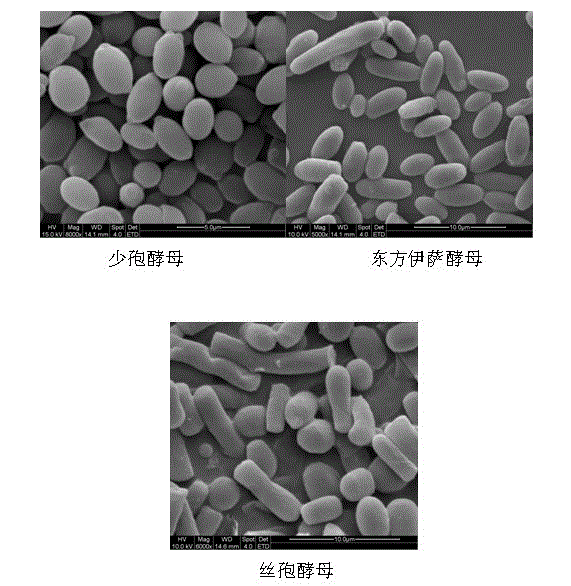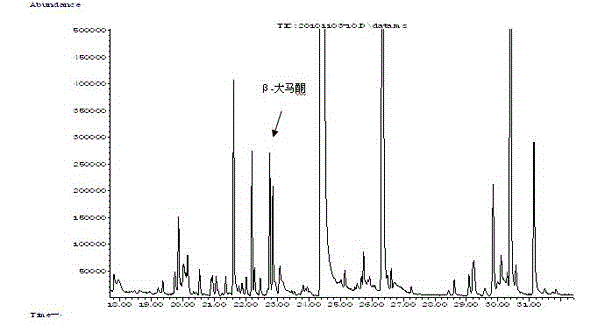Strain produced by screening beta-damascenone in Chinese liquor brewing by utilizing flavor directional technology and application thereof
A technology of damascenone and bacterial strains, which is applied in the preparation of alcoholic beverages, microorganisms, fungi, etc., can solve the problems that have not yet been reported on the large-scale transformation of biological methods to produce β-damascenone, and achieve the effect of quality
- Summary
- Abstract
- Description
- Claims
- Application Information
AI Technical Summary
Problems solved by technology
Method used
Image
Examples
Embodiment 1
[0059] Determination of the production link of β-damascenone: Follow the brewing process of liquor, take 20g of Chinese Daqu or Xiaoqu and fermented wine grains every 2~5 days, add 3 times the quality of ultrapure water, soak at room temperature for 6~24h, Sonicate for 10-60min, centrifuge at 10000r / min for 20min, take 5-8mL supernatant, add 5g NaCl, and measure by HS-SPME-GC-MS. The results are shown in Table 1 according to the concentration changes of flavor substances in the fermented grains. It can be seen from the results that β-damascenone is mainly produced in the 0-5 days of fermentation, so the fermented grains samples fermented for 2 days were selected as the raw material for separation.
[0060] Table 1 Concentration changes of β-damascenone in fermented grains of Fen-flavor liquor
[0061] Fermentation time (days) β-Damascenone concentration (μg / L) 0 8.5 2 12.2 5 16.2 10 15.3 15 15.5 20 17.4 25 16.7 Cylinder out ...
Embodiment 2
[0063] Determination of the screening method for β-damascenone-producing strains: use 0.5g of fermented grains sample fermented with Fen-flavor liquor for 2 days, dissolve in 15mL sterile saline shaker for 30 minutes, then dilute, spread on YPD plate and culture for 2 days , Select strains with different morphology, isolate single bacteria by streaking and transfer to YPD slant medium for preservation. Pick the strains from the slant and culture them in shake flasks. The sorghum saccharification liquid medium is used for cultivation. The production method of the medium is as follows: 20g raw material samples are crushed, add 4 times the volume of water, cook for 2 hours, and it becomes a paste, add 50 units / g of glucoamylase after cooling, and store at 40°C Keep for 2 hours, filter and centrifuge the filtrate, the sugar content is 15 o Bx, adjust the pH to 5. The culture conditions are: 30° C., 150 rpm, and culture for 24 hours. Shake flask culture fermentation broth was de...
Embodiment 3
[0065] β-Damascenone-producing strains and their molecular biological identification: Molecular biological identification of 12 different β-damascenone-producing yeasts was carried out, and the 26srDNA fragments of the 12 strains were amplified by yeast-specific taxonomic identification primers. detected by gel electrophoresis. Sequencing comparison was then carried out to determine the species of the screened yeast. The strains were deposited in the General Microbiology Center of China Committee for the Collection of Microorganisms. See Table 2 for the yeast species and preservation numbers.
[0066] Table 2. 12 β-Damascenone producing strains
[0067] Numbering Chinese name English name Deposit number 1 Pichia anomalies Pichia anomala CGMCC No.4740 2 oriental yeast Issatchenkia orientalis CGMCC No.4741 3 Saccharomyces spp. Saccharomycopsis fibuligera CGMCC No.4742 4 Pichia pastoris powder Pichia farinosa CGMCC ...
PUM
 Login to View More
Login to View More Abstract
Description
Claims
Application Information
 Login to View More
Login to View More - R&D
- Intellectual Property
- Life Sciences
- Materials
- Tech Scout
- Unparalleled Data Quality
- Higher Quality Content
- 60% Fewer Hallucinations
Browse by: Latest US Patents, China's latest patents, Technical Efficacy Thesaurus, Application Domain, Technology Topic, Popular Technical Reports.
© 2025 PatSnap. All rights reserved.Legal|Privacy policy|Modern Slavery Act Transparency Statement|Sitemap|About US| Contact US: help@patsnap.com


